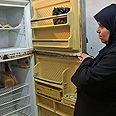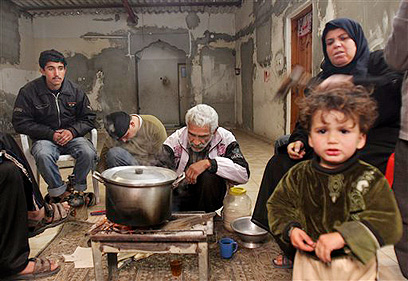
UNRWA: Gaza in dire straits
United Nations relief agency spokesman says Gazans are frustrated, despaired; tells of great need for additional humanitarian aid
"There is no tomorrow in Gaza, no future," said Adnan Abu Hasna, the spokesman for the United Nations Relief and Works Agency (UNRWA), on Tuesday.
Seventeen days into the Israeli offensive in Gaza, and with casualty numbers nearing 900, Hasna said that "it is the civilians, the simple, helpless people who are paying the real price of this war."
The frustration, he added, is growing immensely: "The Gazans are frustrated and that frustration is directed at everyone – Israel, Hamas, the Arab nations and the world… all they want to do is survive for the sake of their children. This (war) is a trauma whose scars will be visible long after a ceasefire is reached."
An explosion rocks the background of Hasna's conversation with Ynet. According to him, a shell landed 100 yards or so from his house; but he remains unfazed. "I'm used to it," he said. "Besides, what can I do? There is nowhere to run."
The shelling has been constant since the offensive began, and panic is growing across Gaza: "The number of civilian casualties has risen expediently. The IDF has long stopped firing in response to fire," he said in an accusatory tone. "It just fires. If you are anywhere near a rocket cell, you will get hurt."
'Gaza in dire straits'
The civilian population in the Strip, he said is in dire conditions: "Nearly 30,000 people have left their homes; over 100 houses are without electricity, half a million people don’t have any water and too many need food… we had 99 truckloads of humanitarian aid came into Gaza yesterday, but it's not enough."
Dr. Hassan Khalaf, director of the Shifa Hospital in Gaza, reiterated the sentiment. According to him, 917 people have been killed since the Israeli campaign began, 42% of them women and children. The casualties number at 4,215 people and Shifa only has 600 beds.

'A trauma whose scars will be visible long after a ceasefire is reached' (Photo: AP)
"The number of casualties keeps rising, but we're coping… We’ve received some donations and supplies from Europe and Western countries and more than 65 foreign doctors have come to help.
"We want to send people to Israeli hospitals, but the Gaza Health Ministry won't allow it. People here would rather die than go to Israel."
The Palestinian people, he added, are more than willing to suffer for their freedom. "Hamas will no go down, because the people are Hamas… negotiations are the only way to end the fighting, and Hamas is willing to talk, just not under Israel's conditions.
"It is a disgrace that the international community allows the bloodshed in Gaza to continue without stopping the Israeli killing machine."
Yael Levy contributed to this report










